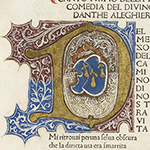Dante Digital Library

The John Rylands Research Institute and Library has one of the finest collections of Dante Alighieri’s works in the world. Dante was a particularly important author for the library’s founder Enriqueta Rylands, who amassed an impressive collection in a relatively short period of time. It includes what is probably the most complete holdings of early printed editions in any library.
The Manchester collection contains fourteen of the fifteen incunable editions of the Divina Commedia, including all three of the earliest editions printed in 1472, and forty-two of the forty-four editions printed up to 1629. There are a number of significant manuscripts dating from the fourteenth to the twentieth century. It also has many early editions of his other works, including the Convivio, De vulgari eloquentia, and the Vita Nova.
The core of the Manchester Dante printed collections, including the rarest and most important early editions, comes from the library of noted aristocratic bibliophile, George John Spencer, 2nd Earl Spencer (1758-1834), which was acquired by Enriqueta Rylands in 1892 from his grandson John Poyntz Spencer (1835-1910), 5th Earl.
In addition to the early editions there are also more than 6500 volumes of later texts and commentaries, many of which were collected by Count Giuseppe Lando Passerini (1858-1932), librarian of the Biblioteca Laurenziana in Florence and a renowned Dante scholar. His collection was purchased by Mrs Rylands in 1906 and brought her library up to date with an expertly curated collection of recent Dante scholarship. The library has continued to collect Dante material as a priority area since its opening and also holds many important twentieth and twenty-first century editions, including Tom Phillips’s iconic illustrated Divine Comedy among others.
Our Manchester Digital Dante Library contains full digitisations of significant manuscripts and early printed editions, accompanied by detailed new bibliographical descriptions. The Dante Treasures section showcases three culturally significant early printed editions from 1477, 1477-78, and 1481, alongside three of our impressive fifteenth- and sixteenth-century Dante manuscripts.
The Dante Early Printed section contains digitisations of every early printed edition of Dante held in our Special Collections and will be launched in several parts. The first part contains our Dante Incunables, comprising all the editions of Dante’s Commedia printed between 1472 and 1500, the second will contain editions from 1502 to 1555, and the third editions printed between 1564 and 1629. We also have a final section containing early printed editions of other works by and concerning Dante, which demonstrate the early modern reception of his works beyond his poem across different print contexts and readerships.




